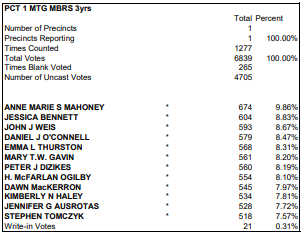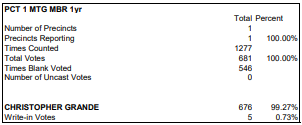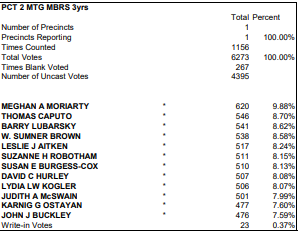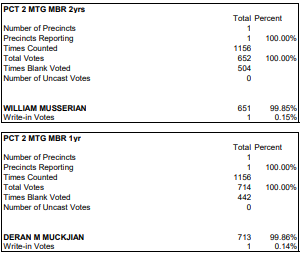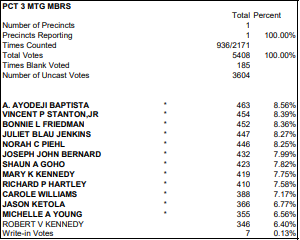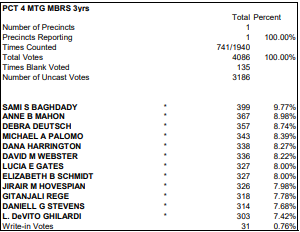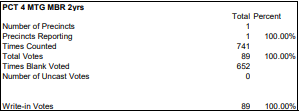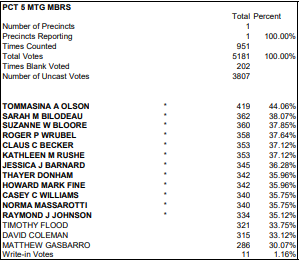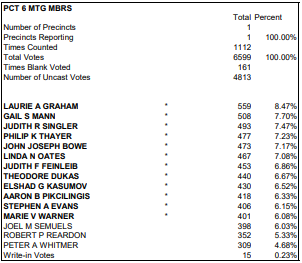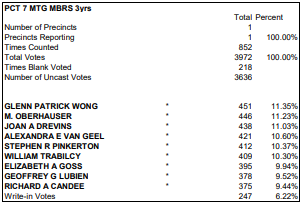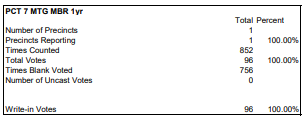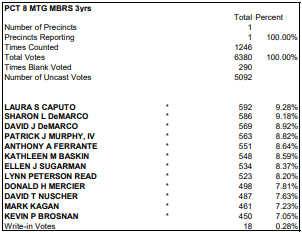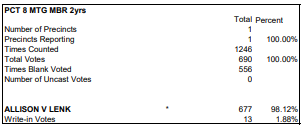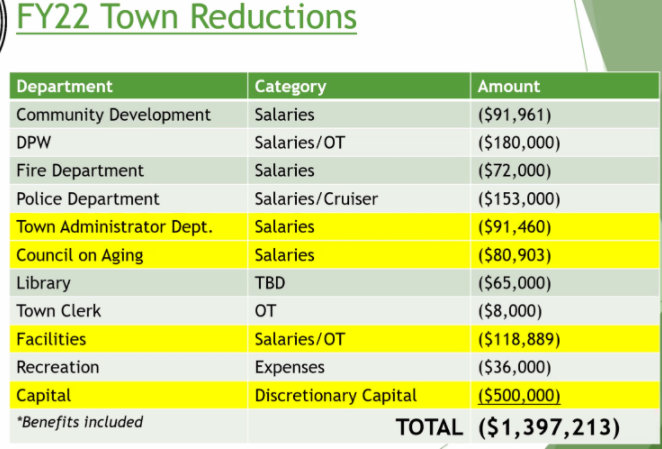Photo: Warden Robert McKie reads out the preliminary results from precinct 2 on Tuesday night
Belmont voters approved a record $8.4 million Proposition 2 1/2 override by a comfortable 1,000-plus vote margin at the annual Town Election held on Tuesday, April 2.
The final tally was 5,120 in the yes column and 4,050 nos as voters accepted the positive argument from the “yes” campaigners to preserve public services and safety and protect Belmont schools from losing educators and maintain its outstanding reputation.
“I think it’s that people love their community,” said Erin Rowland, the campaign manager for Invest In Belmont, the “yes” campaign, when asked the compelling reason voters where willing to increase the property tax just three years after rejecting a smaller override request.
”We want the to see the town thrive and continue to be successful, and that’s the reason people came together. What was so heartwarming about working on the campaign was the outpouring of support from a wide range of residents,” she said in a crowded second floor lobby in Town Hall where candidates, observers and many candidates came after the polls closed at 8 p.m.
Invest in Belmont Chair David Lind said the town has “been through a hard few years and we were in a tough spot financially. I believe that [the override] gets us back onto a better track so we can all work together and keep Belmont as the town that we all know land love.”
Rowland, who was a winner in her race to be selected to Town Meeting from Precinct 6, said she fully understood that Tuesday’s results will be difficult for many residents, especially senior on fixed incomes.
”We are one community and we want to do everything we can to see Belmont implement senior [property] tax relief. We understand that need and it’s very real and we’ll do everything that we can to promote that,” she said.
In the night’s nail biter, voters approved making the Board of Assessors an appointed body by a mere eight votes, 4,218 to 4,210. With 50 ballots – from residents overseas and in the military as well as provisional ballots – yet to be counted, the race is too close to be called.
Final results will be released by the Town Clerk’s office by Friday or Saturday. Unofficial results as of Tuesday at 10 p.m. can be seen here.
In the race to replace Mark Paolillo on the Select Board, Matt Taylor defeated his Warrant Committee colleague Geoff Lubien by 600 votes, 3,851 to 3,248, with newcomer Alex Howard taking home 659 votes.
“I began [this campaign] genuinely wanting to connect with people and doing that in a deeply personal way,” said Taylor after feeling “so separated from our local government and our residents coming out of the pandemic. So I knocked on nearly 1,700 doors. I had a lot of one-on-one conversations. It was very grassroots.”
”I have a lot of hope and I’m ready to work because this is a level where you get to make a real positive difference about the people around you,” said Taylor. “We have to reach out to residents and invite them in to have a broader two-way discussion. It brings us together. This is an “us” thing.”
Voters acknowledged incumbent Meg Moriarty’s successful tenure as the two-term chair of the School Committee by returning her to the board. Moriarty topped the three-person field for the two available three-year seats garnering 5,354 votes.
“[Winning] means I get to keep talking about all of our great students and it’s all about doing best for every single student in our schools,” Moriarty said at Town Hall Tuesday night after the results were read by Belmont Town Clerk Ellen Cushman.
With her return to the School Committee, Moriarty will provide a continuity on the six member body “that helps tremendously” as it “helps keeps the momentum moving forward” on several of initiatives that Superintendent Jill Geiser has proposed.
Joining her on the committee will be first-time candidate Matt Kraft. The Brown University professor took home 5,176 votes, while recent Belmont High School graduate, current Emerson College student and Town Meeting member Angus Abercrombie collected 2,792 votes.
“I hope to take the opportunity to listen and learn both from my fellow school committee members and Belmont residents about our priorities and build on the three year strategic plan that the district is developing,” said Kraft who arrived to Town Hall with his wife and two kids after enjoying Taco Tuesday.
Speaking as the new body on the committee, “I think part of the hard work is to work collaboratively and collectively. And I look forward to those conversations that I know some will be difficult. But that’s the job. We all have a shared commitment towards strengthening our schools for all the students and in building towards, frankly, a brighter future.”
Challenged for the first time in 16 years, long-time Town Moderator Mike Widmer defeated former Warrant and School Committee member Mike Crowley, 4,656 to 3,248.
”People understood that experience is really important, and that running Town Meeting is very demanding. I’ve done it for all these years and voters felt that I had done well in the position,” said Widmer who announced earlier in the year that this term would be his final one as moderator.
